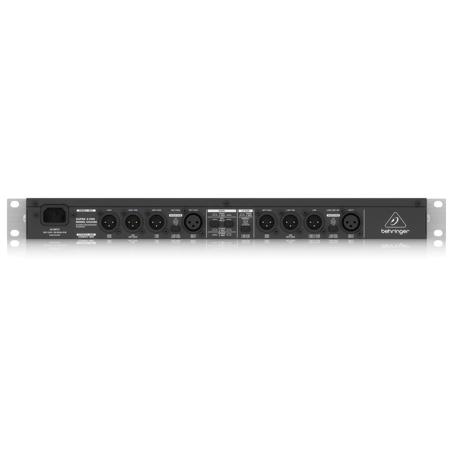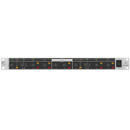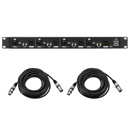
Behringer SUPER-X PRO CX3400 V2 High-Precision Stereo 2-Way/3-Way/Mono 4-Way Crossover with Limiters, Adjustable Time Delays and CD Horn Correction
SKU: BECX3400V2
This item is no longer available.
Recommended Alternatives
Share:
Overview
Compare
Specs
Protection
Q&A
Questions & Answers
Reviews about this item
Review Summary
Select a plan in the Add Protection section above and purchase with this product by clicking “Add to Cart”.
TRUSTED PROTECTION PLANS, EXCEPTIONAL SERVICE.
Invest In Your Gear and Peace Of Mind!
Accidents happen. Protect your favorite Adorama products and purchase a protection plan to stay covered from accidental damage, mechanical or electrical failures, and more.
Repair or Replacement
If we can’t fix it, we’ll replace it at no additional cost.
Accidental Damage
Protect your product from drops, spills, and more.
Peace of Mind
Enjoy your gear without fear. We have you covered!
Failure Protection
When regular use of your product over time results in mechanical or electrical failure.
Zero Deductible
We will never charge you a deductible after the purchase of a plan.
Customer-Focused Support
Our claims process is simple & easy and our customer service team is happy to help.
Adorama Protect powered by Extend is available for purchase to customers in the United States. Not available for international or U.S. territories purchases. Plans on open box items do not cover pre-existing damage.
Adorama Protect plans are available for ABS clients. If you have any questions or require assistanse, please call 800-223-2500
Browse our FAQ
Behringer SUPER-X PRO CX3400 V2 Specifications
Audio Inputs
Audio Inputs
Jump to...Audio Input Type
XLR, HF-filtered, electronically servo-balanced
Impedance
>50k Ohms balanced, >25k Ohms unbalanced
Max. input level
+22 dBu, balanced or unbalanced
CMRR
Typically >60 dB at 1kHz
Audio Outputs
Jump to...Audio Output Type
XLR, HF-filtered, electronically servo-balanced
Impedance
100Ohms balanced or unbalanced
Max. output level
+21 dBu, balanced or unbalanced
Performance
Jump to...Bandwidth
20 Hz to 20 kHz, +0/-0.8 dB
Frequency response
< 10 Hz to > 55 kHz, +0/-3 dB
Signal-to-noise
+4 dBu, 20 Hz to 20 kHz, unweighted
Low output
Stereo mode: > 94 dBu
Mono mode: > 94 dBuLow-mid output
Mono mode: > 98 dBu
Mid output
Stereo mode: > 98 dBu
High-mid output
Mono mode: > 96 dBu
High output
Stereo mode: > 94 dBu
Mono mode: > 94 dBuDynamic range
> 110 dB, unweighted
THD & noise
Stereo mode: Limiter off < 0.04 %
Mono mode: Limiter on < 0.5 %Interchannel crosstalk
High to low: < -95 dBu
High to mid: < -97 dBu
Mid to low: < -97 dBu
High to high-mid: < -96 dBu
High-mid to low-mid: < -97 dBu
Low-mid to low: < -98 dBu
Crossover
Jump to...Filter type
24 dB/oct., Linkwitz-Riley, state-variable
Stereo mode Xover frequencies
X1: Low / high: 44 Hz to 930 Hz
Low / mid: 44 Hz to 930 Hz
Mid / high: 440 Hz to 9.3 kHz
x10: Low / high: 440 Hz to 9.3 kHz
Low / mid: 440 Hz to 9.3 kHzMono mode Xover frequencies
X1: Low / low-mid: 44 Hz to 930 Hz
Low-mid / high-mid: 440 Hz to 9.3 kHz
High-mid / high: 440 Hz to 9.3 kHz
x10: Low / low-mid: 440 Hz to 9.3 kHz
Function Switches - Front panel
Jump to...Low cut
Activates 25 Hz, 12 dB/octave high-pass filter, Butterworth
Mute
Mutes the individual output
Phase invert
Inverts the phase at the individual output
CD horn
Corrects CD horn frequency response above 3.5 kHz
Limiter
Activates the limiter function for all outputs
Function Switches - Rear panel
Jump to...Xover frequency
Multiplies crossover frequency range by 10
Mode
Selects stereo/mono and 2/3/4-way operation
LF sum
Selects normal stereo or mono-summed low frequency operation ON = Channel 1 + 6 dB louder / Channel 2: the same as before
Controls
Jump to...Input
Controls the input gain (+/-12 dB)
Xover frequency
Controls the crossover frequency
Delay
Controls the delay at the low output (0 to 2 msec.)
Gain
Controls the output gain (+/-6 dB)
Threshold
Controls the threshold of the limiter (-6 dB to OFF)
Power
Jump to...Switch mode power supply
Autorange, 100-240 V, 50/60 Hz
Power consumption
15W
Mains connector
Standard IEC receptacle
General
Jump to...Dimensions (HxWxD)
44 x 483 x 147mm (1.73 x 19.02 x 5.79")
Weight
1.7kg (3.75 lbs)
About Behringer SUPER-X PRO CX3400 V2
The CX3400 stereo 2-way/3-way/ mono 4-way crossover provides the ultimate in high-precision audio frequency separation, thanks to its state-of-the-art circuitry, superior-grade components, ultra low-noise op amps and balanced I/O connectivity. CX3400 features include: Limiters on all crossover outputs for optimal loudspeaker protection; an adjustable Time Delay for proper phase-alignment of the drivers; High-Frequency (HF) horn equalization for constant-directivity compensation; and a mono "Low Sum" Output (stereo modes only), which is ideal for your subwoofer applications.
Sound Quality
When a sound system is properly tuned, it becomes powerful, balanced and efficient. Bass content is punchy and tight, with vocals and instruments that are rich, crisp and well defined. The CX3400 crossover's accurate signal processing protects critical loudspeaker components and improves overall system efficiency. All Input and Output connections are balanced/unbalanced XLR and feature 25 Hz Low Cut filters for low-frequency driver protection - plus offer Mute and Phase Invert switches, making troubleshooting even a large system - virtually effortless!
What's a Crossover
Chances are if you're reading this, you already know what a crossover is - and you know that you need one. But if you are new to multi-way PA systems, here's a brief overview. Loudspeakers (which we call transducers) convert electrical signals into sound waves. And no matter how well a transducer is designed or made, it simply cannot reproduce the entire audio spectrum all by itself.
Low-frequency sounds tend to push a transducer to the maximum, making it impossible for that same transducer to reproduce the treble content with the sound quality it deserves. (Try singing high falsetto next time you're bench-pressing your limit!) That's why high-quality sound systems use multiple speakers (woofers and tweeters) to spread out the work. While the woofer (usually the larger transducer) does all the heavy lifting, the tweeter can easily handle the high-frequency content. Three and four-way systems distribute the work even more, allowing the individual transducers to reproduce the frequency range for which they were designed. It is the crossover's function to divide these tasks between the various amplifiers and transducers.
Divide and Conquer
The CX3400 provides three modes of operation: 2-way stereo, for Left and Right Lows (woofers) and Highs (tweeters); and 3-way stereo, for Left and Right Lows, Mids and Highs; and 4-way mono, for Lows, Low-Mids, High-Mids and Highs. For your convenience, the CX3400's front panel features an elegant and easy-to-read LED matrix, so you can see at a glance which operating mode has been selected - and which controls are currently active.
CD Horn Compensation
When a driver radiates into open space via a horn, its efficiency increases. Over the past few years, constant-directivity horns have gained widespread popularity, since they are designed to produce consistent dispersion over their entire frequency range - however, the higher the frequency, the lower the efficiency. To compensate for this, the CX3400 includes a switchable pre-EQ for CD horns that ensures a flat frequency response, even before equalization is applied. This pre-EQ raises the signal gain by 3 dB at 3.5 kHz, which then increases by 6 dB/oct. up to 22.5 kHz.
Behringer SUPER-X PRO CX3400 V2 Features
- Professional stereo 2-way/3-way/mono 4-way crossover featuring state-of-the-art Linkwitz-Riley filters with 24 dB/octave
- Individual Limiters on each output for optimal loudspeaker protection
- Adjustable time delay for phase alignment between drivers
- CD horn equalization for constant directivity horn compensation
- Absolutely flat summed amplitude response, zero phase difference
- "Low Sum" function provides mono output for subwoofer operation
- Individual output Gain controls for all bands
- Individual output Mute switches for easy band adjustment
- Individual Phase reverse switches for instant phase correction
- Switchable 25 Hz Low cut filter on each input for low-frequency driver protection
- Servo-balanced and gold-plated XLR connectors for all inputs and outputs
- Ultra-high precision potentiometers for ultimate accuracy and repeatability
- Illuminated switches for secure operation in dark stage environments
- Internal switch-mode power supply (100 - 240 V) for noise-free audio and low power consumption
- 3-Year Warranty Program
What's in the box:
- Behringer SUPER-X PRO CX3400 V2 High-Precision Stereo 2-Way/3-Way/Mono 4-Way Crossover
- Adorama 1 Year Limited Warranty

